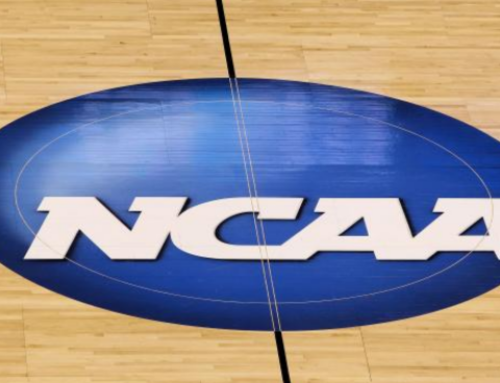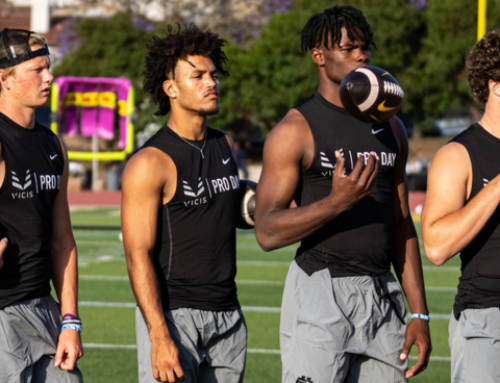‘Should I Go to This Camp?’ Tackling a Hot Topic for High School Football Players
“What camps should I go to?”
It’s a question I consistently hear from high school athletes and their parents at this time of year. There are so many different ones to choose from that the process can seem overwhelming. Many of them also believe camps are essential to earning a scholarship and being able to play sports in college, only furthering the anxiety.
Let me start by delivering my honest, uncut opinion: Most camps are moneymakers for the people who run them, and little else. These types of camps, which are becoming increasingly common, are not golden tickets to college sports, and there’s truly little to be gained by attending them. Does this mean you should avoid camps all together? Not necessarily. Let’s break down the process a little further and clear up a few misconceptions you might have about camps and the camp experience.
The first thing to understand is that receiving an “invite” to a camp is rarely as exclusive as you may think. There are exceptions of course, but a lot of camps blast out thousands of letters hoping to entice kids to attend and to convince their parents to shell out the $350 it costs for the one-day session. They often do this by advertising that college coaches will be in attendance. Let’s say one camp advertises that a coach from the MAC will be there to help run the camp and scout talent.
Automatically, you draw a mental picture of a coach wearing a cool pair of shades and a collared school shirt with khaki pants standing on the sideline with a clipboard and viewing the action looking for that one super player who will knock his socks off and get offered on the spot. You think it might just be you. This could be your big break.
Is it possible? Sure. Is it likely? Not even a little bit.
In reality, many camps will pack in hundreds of kids. The action will be fast-paced because they need to get everyone reps. You’ll often be broken up into position groups of 20 or so. You will do some warm-ups and then break down into instruction and drills. You get in line and they start barking out “Let’s go! Move, move, move!” You fly through the drills, and at the end of your rep you get a quick 10-second sound bite from a high school coach who volunteered to work the camp. Wait, not the college guy? No, not the college guy. The high school coach is happy he gets a shirt, a hat and a free lunch, but he wasn’t the one advertised on the brochure. No problem, you think—the college coach is at the next station, so it’s time to shine!
OK, you’re up. They call a play; you are running a simple wheel route. Hut, hut! They snap the ball, you sprint out there, run a great route, look over your shoulder to track the ball, and the quarterback overthrows you by a mile. You look over to see the college coach isn’t even watching and then a high school coach yells out “Gotta hustle, kid!” The college coach glances over and sees you jogging back to the group to wait your next turn. The same thing basically happens on the next two plays, then it’s off to the next station. Tough break, kid.
The final whistle of the day shrills, they hand out t-shirts, and everyone goes home. The college coach never said a word to you. You’re devastated and feel like a flop. Don’t despair. Why?
Because the reality is that the college coach likely went there to evaluate an athlete or two they are actively recruiting. They wanted to watch them, not you. Colleges don’t want to sent their coaches hundreds of miles to go on fishing expeditions and look for diamonds in the rough. Due to the huge number of prospects they analyze every year, they have to be more targeted in their approach. If you’re not on their radar coming in, odds are the coach won’t notice you. It sounds pessimistic, and there are of course rare exceptions, but that’s how it is.
Also, the $350 it cost your parents ended up being more like $500. Mom and dad went with you, and they had to fill the tank for the long drive there and back. Then you had to stop and eat breakfast on the way. On the way back, you have to grab another tank of gas and stop to eat dinner. It’s 10 p.m. by the time you get home and all you have to show for it is basically a $500 t-shirt.
This is just one scenario, but it’s a very common one, and there are many like this that yield the same results. Ask yourself: How many athletes do you know who have gotten offers by randomly showing up to a camp and wowing a school who’d never heard of them? I’d bet zero. How do I know this? I’ve worked such camps, big and small, for over 20 years.
So do you forgo camps entirely? No. But it’s about being smart and not plunking down hundreds of dollars to any and every camp you come across. First, figure out a school you’d like to attend. Then, honestly ask yourself if you feel you can play there. If the answer is yes, contact the college coach for your recruiting district (this info is typically on the football program’s website). Send him an email introducing yourself, explain why you’re interested in the program, share some key metrics (GPA, recent stats, your class year, etc.), and provide a link to your highlight tape. Also let them know you’re interested in their school and would like to come to their camp over the summer.
If you get a reply, awesome—now you can start a running dialogue with the coach. If you’re a high school junior, you can also inquire about coming to their junior day. You don’t want to be contacting the coach every single day, but once every few weeks can be helpful. Don’t be afraid to pick up the phone and call them, either—it makes more of an impact rather than solely exchanging emails. Ask good questions and provide meaningful updates on your academics or athletics.
Once you arrive at the camp, the coach will now be able to put a face to the name. This will instantly give you a leg up on most campers. You can introduce them to your mom and dad, make some small talk, and then hopefully impress them in the drills now that they’re actually aware of your existence. Regardless of the result, at the end of the day, approach the coach again to say thank you and goodbye. When you get home, shoot them a follow-up email.
If you follow this formula three times at three realistic options, you’ll end up getting some meaningful feedback and actually give yourself a shot at a scholarship. The recruiting process can be stressful and frustrating, but if you want to play in college, it’s all but unavoidable. The best advice I can give you is to be realistic. Look for a place where you can thrive—don’t just chase the biggest names out there. And while many see camps solely as a vehicle for college exposure, that doesn’t necessarily have to be true. If you hear a camp offers really great instruction and kids are feeling like the experience genuinely made them better football players, those can be worth looking into, as well.
During this camp season, hone in on opportunities where you feel like you can be noticed and receive good instruction. Don’t fall for the cash-cow cattle calls where both the experience and the exposure are subpar. Do your homework, talk to fellow players about their camp experiences, and zero in on the ones you feel offer true value. Make sure at least one coach knows your name before you get there, and once you’re at the camp, realize that how you hustle and how you carry yourself can be equally important to how you actually perform in the drills.
Photo Credit: KPegg/iStock
READ MORE FROM RICK SCARPULLA:
RECOMMENDED FOR YOU
MOST POPULAR
‘Should I Go to This Camp?’ Tackling a Hot Topic for High School Football Players
“What camps should I go to?”
It’s a question I consistently hear from high school athletes and their parents at this time of year. There are so many different ones to choose from that the process can seem overwhelming. Many of them also believe camps are essential to earning a scholarship and being able to play sports in college, only furthering the anxiety.
Let me start by delivering my honest, uncut opinion: Most camps are moneymakers for the people who run them, and little else. These types of camps, which are becoming increasingly common, are not golden tickets to college sports, and there’s truly little to be gained by attending them. Does this mean you should avoid camps all together? Not necessarily. Let’s break down the process a little further and clear up a few misconceptions you might have about camps and the camp experience.
The first thing to understand is that receiving an “invite” to a camp is rarely as exclusive as you may think. There are exceptions of course, but a lot of camps blast out thousands of letters hoping to entice kids to attend and to convince their parents to shell out the $350 it costs for the one-day session. They often do this by advertising that college coaches will be in attendance. Let’s say one camp advertises that a coach from the MAC will be there to help run the camp and scout talent.
Automatically, you draw a mental picture of a coach wearing a cool pair of shades and a collared school shirt with khaki pants standing on the sideline with a clipboard and viewing the action looking for that one super player who will knock his socks off and get offered on the spot. You think it might just be you. This could be your big break.
Is it possible? Sure. Is it likely? Not even a little bit.
In reality, many camps will pack in hundreds of kids. The action will be fast-paced because they need to get everyone reps. You’ll often be broken up into position groups of 20 or so. You will do some warm-ups and then break down into instruction and drills. You get in line and they start barking out “Let’s go! Move, move, move!” You fly through the drills, and at the end of your rep you get a quick 10-second sound bite from a high school coach who volunteered to work the camp. Wait, not the college guy? No, not the college guy. The high school coach is happy he gets a shirt, a hat and a free lunch, but he wasn’t the one advertised on the brochure. No problem, you think—the college coach is at the next station, so it’s time to shine!
OK, you’re up. They call a play; you are running a simple wheel route. Hut, hut! They snap the ball, you sprint out there, run a great route, look over your shoulder to track the ball, and the quarterback overthrows you by a mile. You look over to see the college coach isn’t even watching and then a high school coach yells out “Gotta hustle, kid!” The college coach glances over and sees you jogging back to the group to wait your next turn. The same thing basically happens on the next two plays, then it’s off to the next station. Tough break, kid.
The final whistle of the day shrills, they hand out t-shirts, and everyone goes home. The college coach never said a word to you. You’re devastated and feel like a flop. Don’t despair. Why?
Because the reality is that the college coach likely went there to evaluate an athlete or two they are actively recruiting. They wanted to watch them, not you. Colleges don’t want to sent their coaches hundreds of miles to go on fishing expeditions and look for diamonds in the rough. Due to the huge number of prospects they analyze every year, they have to be more targeted in their approach. If you’re not on their radar coming in, odds are the coach won’t notice you. It sounds pessimistic, and there are of course rare exceptions, but that’s how it is.
Also, the $350 it cost your parents ended up being more like $500. Mom and dad went with you, and they had to fill the tank for the long drive there and back. Then you had to stop and eat breakfast on the way. On the way back, you have to grab another tank of gas and stop to eat dinner. It’s 10 p.m. by the time you get home and all you have to show for it is basically a $500 t-shirt.
This is just one scenario, but it’s a very common one, and there are many like this that yield the same results. Ask yourself: How many athletes do you know who have gotten offers by randomly showing up to a camp and wowing a school who’d never heard of them? I’d bet zero. How do I know this? I’ve worked such camps, big and small, for over 20 years.
So do you forgo camps entirely? No. But it’s about being smart and not plunking down hundreds of dollars to any and every camp you come across. First, figure out a school you’d like to attend. Then, honestly ask yourself if you feel you can play there. If the answer is yes, contact the college coach for your recruiting district (this info is typically on the football program’s website). Send him an email introducing yourself, explain why you’re interested in the program, share some key metrics (GPA, recent stats, your class year, etc.), and provide a link to your highlight tape. Also let them know you’re interested in their school and would like to come to their camp over the summer.
If you get a reply, awesome—now you can start a running dialogue with the coach. If you’re a high school junior, you can also inquire about coming to their junior day. You don’t want to be contacting the coach every single day, but once every few weeks can be helpful. Don’t be afraid to pick up the phone and call them, either—it makes more of an impact rather than solely exchanging emails. Ask good questions and provide meaningful updates on your academics or athletics.
Once you arrive at the camp, the coach will now be able to put a face to the name. This will instantly give you a leg up on most campers. You can introduce them to your mom and dad, make some small talk, and then hopefully impress them in the drills now that they’re actually aware of your existence. Regardless of the result, at the end of the day, approach the coach again to say thank you and goodbye. When you get home, shoot them a follow-up email.
If you follow this formula three times at three realistic options, you’ll end up getting some meaningful feedback and actually give yourself a shot at a scholarship. The recruiting process can be stressful and frustrating, but if you want to play in college, it’s all but unavoidable. The best advice I can give you is to be realistic. Look for a place where you can thrive—don’t just chase the biggest names out there. And while many see camps solely as a vehicle for college exposure, that doesn’t necessarily have to be true. If you hear a camp offers really great instruction and kids are feeling like the experience genuinely made them better football players, those can be worth looking into, as well.
During this camp season, hone in on opportunities where you feel like you can be noticed and receive good instruction. Don’t fall for the cash-cow cattle calls where both the experience and the exposure are subpar. Do your homework, talk to fellow players about their camp experiences, and zero in on the ones you feel offer true value. Make sure at least one coach knows your name before you get there, and once you’re at the camp, realize that how you hustle and how you carry yourself can be equally important to how you actually perform in the drills.
Photo Credit: KPegg/iStock
READ MORE FROM RICK SCARPULLA:
RECOMMENDED FOR YOU
Create A Free Recruiting Profile Today!
CaptainU helps athletes & parents not only be proactive but also to manage and take control of their entire recruiting journey.












